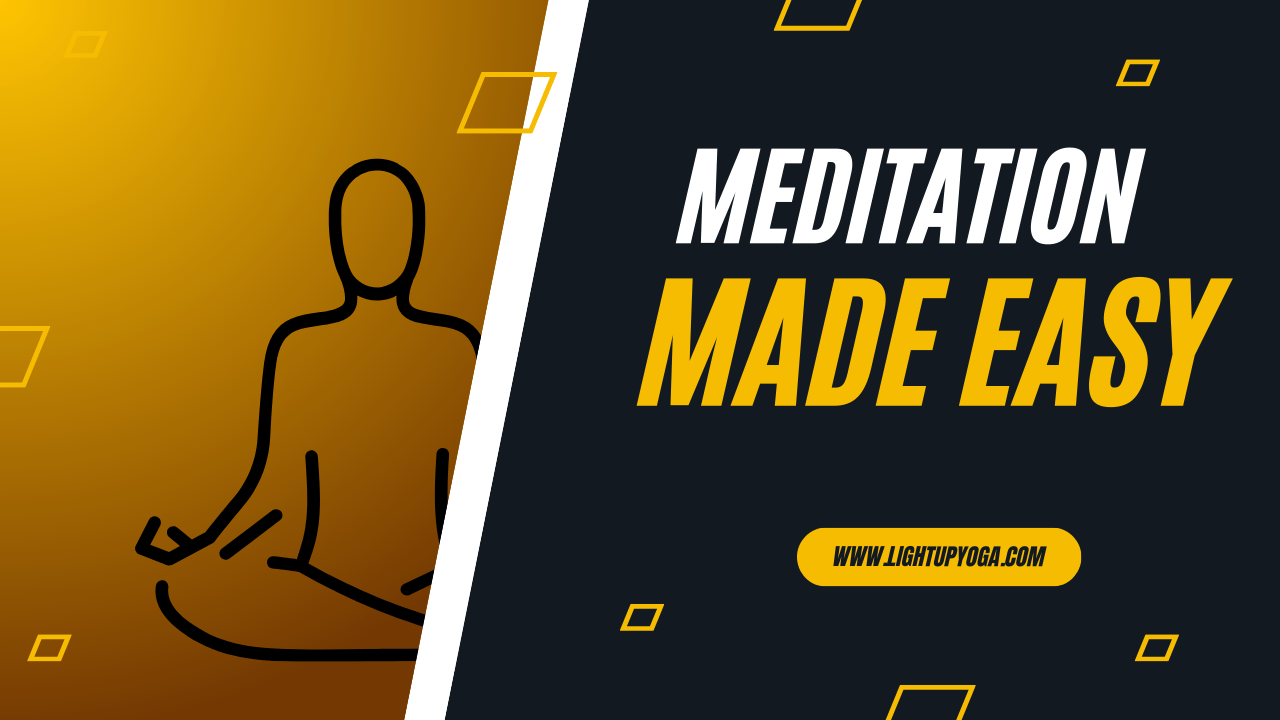Introduction

It’s not easy to practice meditation, especially if you’re not familiar with slowing down. We often believe that meditation is a process of intense concentration. However, the reality is much more relaxed. Meditation isn’t about imposing silence on your mind or blocking out any thought but rather accepting things the way they are. In this article, we’ll look at the reasons why meditation can be difficult and ways to ease into the process. Some steps will allow you to breathe easily and concentrate naturally and without the requirement for perfection.
Section 1: Why Meditation Feels Hard—The ‘Trying Too Hard’ Trap
- The pressure for you to “Do It Right” It’s common to desire to do your meditation “perfectly.” You might be under pressure to be completely focused or concentrate on your breathing without becoming distracted. But expecting perfection makes meditation harder. The purpose of meditation is observation, not control. If we push ourselves to do too much, we get anxious and annoyed, which is the exact opposite of what we would like to achieve.
- Why Mind-Worning Is Normal When you’re in a state of meditation, it’s normal to let your mind wander. It is commonplace for all people, including experienced meditators. Human brains are designed to think, which is why thoughts will come up! Meditation isn’t just about putting them down but rather observing them and not becoming distracted. When your thoughts wander, it’s a chance to try letting go, gently bringing your focus to the present.
- The Breathing Dilemma The act of focusing on breathing sounds easy; however, it can feel weird or rushed. You may become more conscious of every breath you take and exhale, which may be uncomfortable and odd. It happens because we’re used to breathing naturally. When we begin to concentrate on the breath, we may think that we’re trying too difficult. It is important to approach breathing in a way that is not controlled but with curiosity.
Section 2: How to Find Balance and Ease in Meditation
- Letting the illusion of Perfection Start by recognizing that there isn’t a “right way” to meditate. Each session will be slightly different, and that’s ok. Concentrate on the moment, not the outcome. Don’t be entangled in the desire to “clear the mind,” and let yourself take a moment and be aware of what is happening. Relaxation is often the key to peace and tranquility in meditation.
- Take advantage of “soft focus.” Instead of focusing on each breath, you can try the concept of “soft focus.” Imagine you’re looking at a candle flame. You’re aware of it, but you’re not focusing on it. Try this with your breathing by paying attention to every breath with a gentle pause, letting it flow and go without securing it.
- The Return to Anchor An anchor can be described as something that you can use to concentrate on, such as your breath or a soothing word. When you observe your mind wandering to the side, gently return it towards your anchor. This isn’t all about “forcing” focus; it’s about accepting that wandering is bound to occur and returning to your area of focus gently.
Section 3: Practical Techniques for Relaxed Breathing and Focus
- techniques for visualizing Visualization can create a more natural experience of meditation. Imagine the breath in waves like the beach that flow in and out. Imagine that every exhale and inhale is an easy wave. This will aid in staying focused and not feeling stiff.
- Body scan for grounding: Prior to taking a breath-focused approach and concentrating on the breath, do a quick body scan to feel the way you think. Start with your head, gradually move to your feet, and observe any sensations that are a sign of tension or a feeling of relaxation. This technique of grounding makes it easier to relax into your breathing afterward.
- Breath Awareness without Control: In lieu of directing your breathing, let it happen simply. Imagine that you’re watching things that occur naturally. It’s not your intention to force yourself to breathe more or slower, but simply take in the scene with a gentle interest. A simple change in your breathing makes breathing more relaxed and effortless.
Section 4: Releasing the Urge to Judge Progress
- The process of trusting meditation is a process. It’s not about achieving an endpoint but rather becoming present. As time passes, you’ll experience moments of peace, although they’ll be tiny initially. Remember that each moment you sit down to meditate, you’re building a solid base, even if it’s not deep at first.
- The Small Wins You Can See The progress in meditation is often seen in small increments. You might notice that you can sit for an extended period or feel more relaxed. Be grateful for these little occasions as they arise. These little wins can be the foundation of the more extensive practice.
- Acceptance of the key Accepting meditation means not being able to judge how you’re doing. There’s no test or grade for meditation! Just letting the experience happen, regardless of what transpires, is where the most beneficial results will be. Keep in mind that every time you are able to accept the moment and allow it to unfold, you’re already doing your best.
Conclusion: Meditation as a Gentle Practice
Meditation is designed to be a relaxing and natural exercise. It’s not about making you remain still or forcing your mind to concentrate. Instead, it’s about allowing yourself to be present in whatever is happening. Be mindful, let yourself be imperfect, and then celebrate every session. As time passes, you’ll feel more relaxed, and it gives you more peace with each breath at one time.
FAQs















Add comment